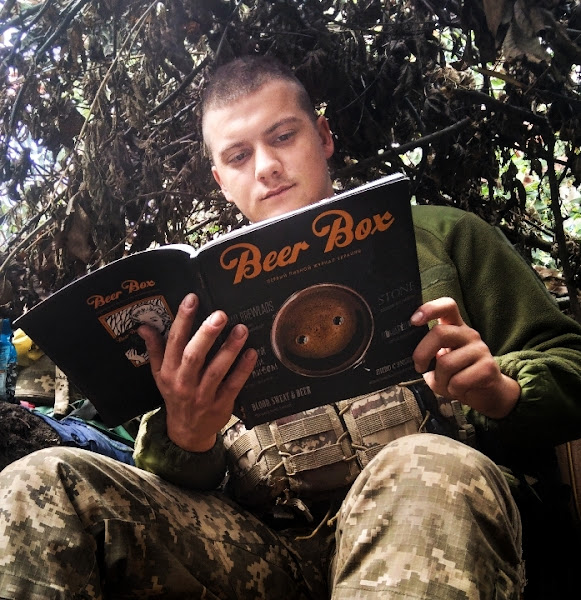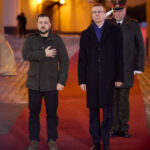Russia’s full-scale invasion of Ukraine changed the Ukrainian media a lot. Military correspondents and journalists have become those who cover events in the country for Ukrainians and for people abroad, sometimes risking their own lives. However, there are also those media people who have completely changed the typographic smell of a fresh publication into a real weapon.
An example was the BeerBox periodical, whose founder and employees made the decision together to protect Ukraine from the Russian invasion. It is worth paying special attention in this story that the founder of the magazine Dmytro Nazarenko, even during the days of the war, found the time, desire, and strength to create a new issue of BeerBox.
This is not a standard magazine, but the only glossy periodical about beer in Ukraine for many readers. Most analogs are aimed at professionals and businessmen, and in BeerBox, you can find technologies, history, and biographies of outstanding personalities of the industry, which will be a revelation for the general public.
Dmytro Nazarenko agreed to give an interview for Euro-Atlantic Ukraine, and today, we bring it to you.
Euro-Atlantic Ukraine: After February 24, many publications collapsed. Was there a moment when you thought there would be no more magazines?
Dmytro: You know, I once had a period where I told myself I wasn’t going to do BeerBox anymore. But it was only once.
On the contrary, I remember moments when someone told me the magazine seemed to have closed, ceased to exist, etc. But I always explained: I invented this magazine, so it is up to me to decide whether it closed or not. And if you didn’t hear that from me, you’re being fooled.
Here, on the front line, when there is time to rest, you try to abstract from the war (as much as possible) and remember civilian life. I constantly had thoughts about work and the magazine. I thought that it would be necessary to do this or that. At the beginning of the war, there were only ideas. Later, thoughts about work remained thoughts, and regarding the magazine, they were embodied in another issue.
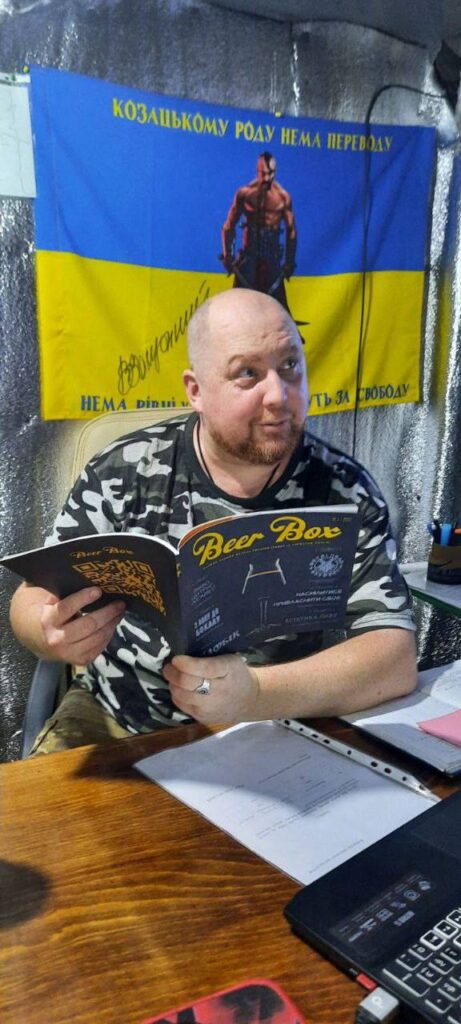
The founder of BeerBox magazine Dmytro Nazarenko
Euro-Atlantic Ukraine: What is a magazine for you now? Is it a protest against the war, hello” to a peaceful life, self-realization, a chance to get funds, or something else?
Dmytro: Money? For the entire existence period of the magazine, it remained my hobby, which does not bring money. Now, the magazine is, most likely, a way to distract yourself, remind you of your existence, and talk about the breweries that survive in occupation and frontline cities. Some of them donate to the Armed Forces of Ukraine or support in some other way.
Euro-Atlantic Ukraine: Don’t you have doubts like “Who needs this during the war”?
Dmytro: I don’t have it. There were (and there are) people to whom I offer to make an interview or article for the magazine, and they answered: “It’s not time. We have a war.” Really? Is this what you are telling me???
Euro-Atlantic Ukraine: The worst things in the world happen because of indifference, but the war showed that, fortunately, there are those around who really care. You said that the first “military” issue was able to be printed because there was a person who offered financial assistance. How did you find each other?
Dmytro: You know, during the pandemic, it was even more difficult than now. That’s when, by the way,
the magazine was made “on the table” for two years. And when everything started to work more or less at the end of 2021, we decided to print our BeerBox again.
With a businessman from Dnipro Oleksandr Sushko (co-owner of Beer Bank beer stores from Dnipro), we initially prepared only his interview for the magazine. But later, he offered to finance the entire circulation so we could reach the pre-COVID level as soon as possible.
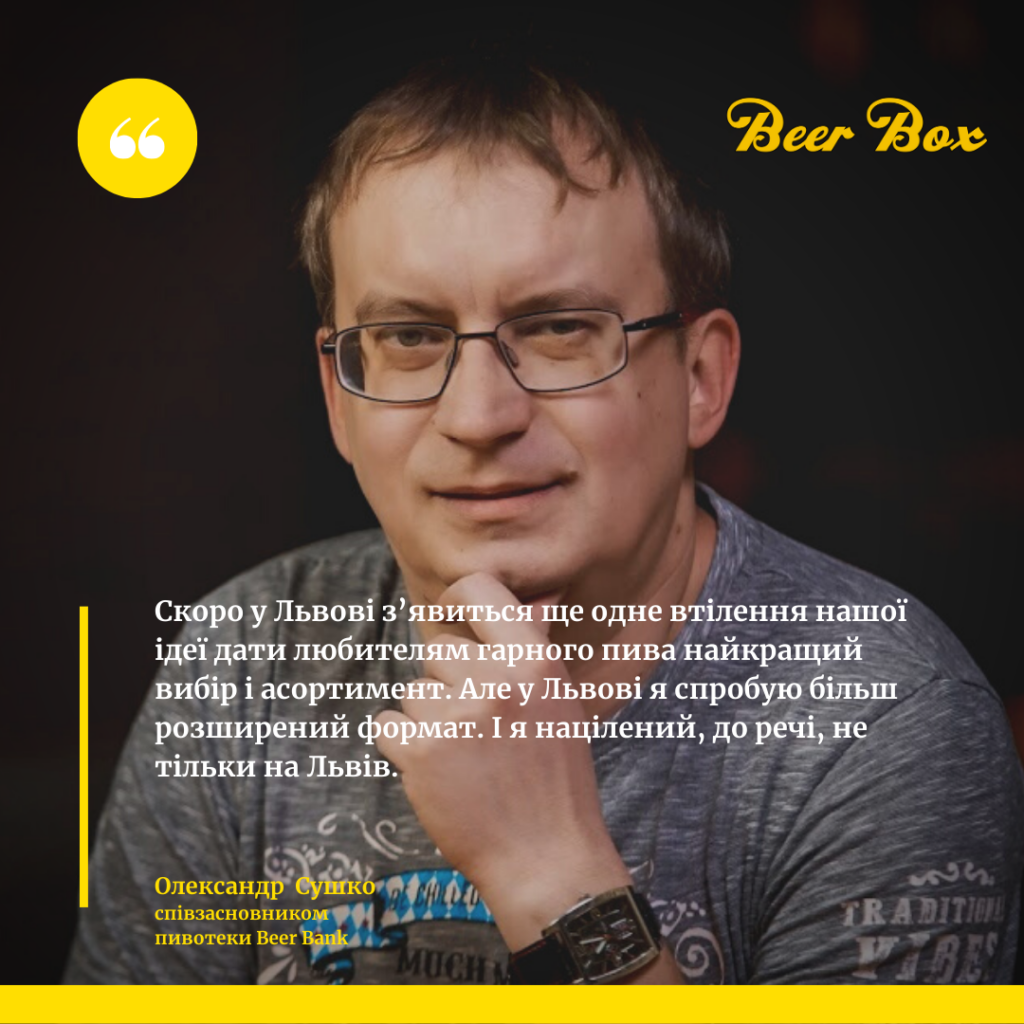
Oleksandr Sushko is a philanthropist who supported BeerBox in a difficult time.
However, a full-scale invasion made its adjustments. Collection of material, layout – everything slowed down. But in the end, when everything was ready, we were able to print.
Euro-Atlantic Ukraine: Did you notice that the magazine changed during the war?
Dmitry: Of course, it has changed. First, it is now published entirely in Ukrainian. At first, we had articles in both Russian and Ukrainian. Now, they are exclusively in Ukrainian, from beginning to end. Second, the topic of war is now present in almost every interview, whether it is the attitude to specific events, memories, or plans for the future after victory.
Euro-Atlantic Ukraine: Tell us a little about the creation process of a magazine in wartime conditions. Let colleagues abroad be surprised!
Dmytro: However, some stages of creation have not changed. There are certain sections in the magazine, and I prescribe what will be in the next issue as usual. I also ask what readers or colleagues would like to see.
For some headings, you need to find a lot of information so that the material can come out of it. We write or call the interviewers. That is, technically, everything is the same as before. However, there is not always time to do even this.
We have columnists, such as Lana Svitankova or Andrii Yuraho, who provide us with their articles for the magazine. Some material, for example, for the “History” section, is given to journalist Svitlana Shevchenko.
Then everything is more difficult. The fact is that before the war, the three of us worked on the magazine: I wrote and did the design, Dmytro Herasymov took photos, and Vadym Komuniar did the layout. But now we are all at war: Territorial defense, National Guard, Voluntary formation of a territorial community. And if Vadim can still do layout from time to time, the photographer is temporarily hired by us.
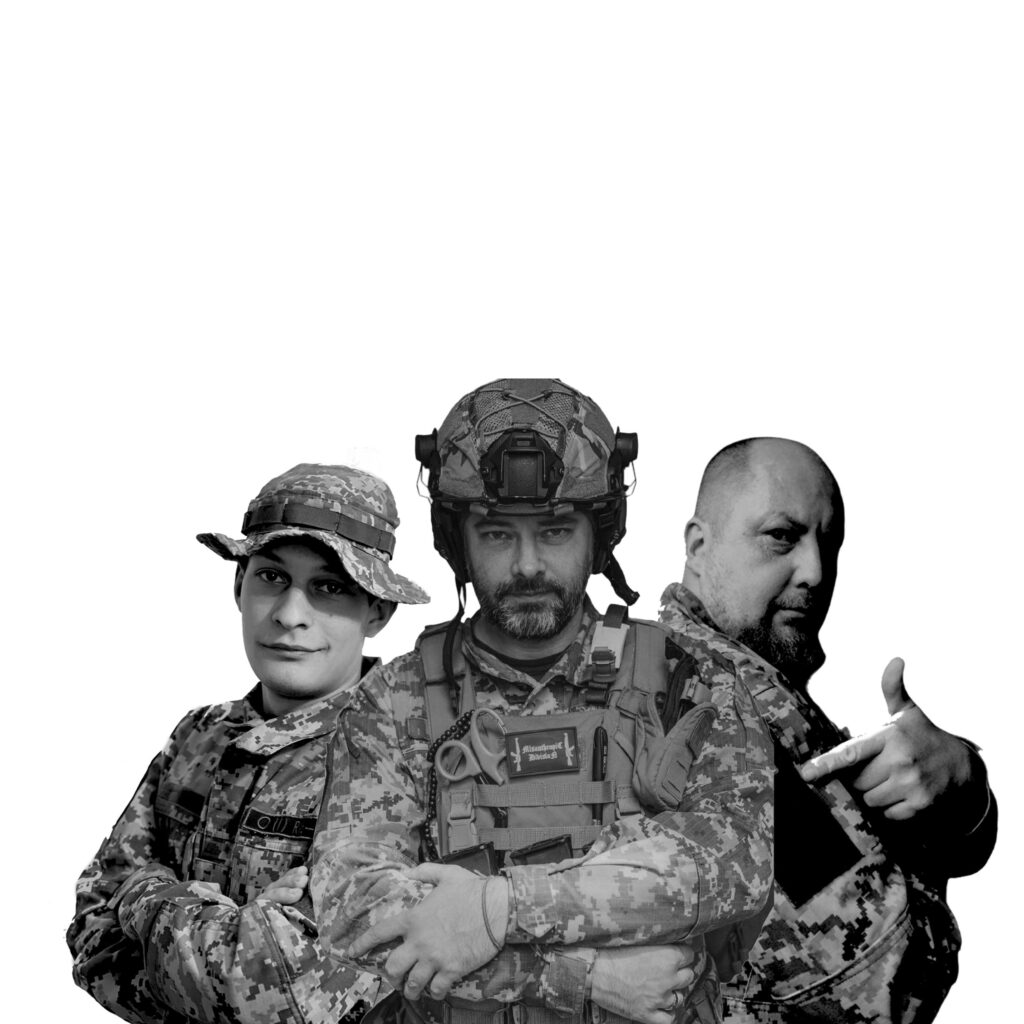
The entire pre-war male BeerBox team is now fighting
Euro-Atlantic Ukraine: Next to you are military personnel. Are your brothers-in-arms interested in what you do?
Dmytro: Whether you want it or not, your whole life is in the palm of your hand here. So, of course, everyone knows about the magazine. They are interested, read, and ask about the next issue. I, for my part, “conduct explanatory work” among my brothers. Already, a few of them want, if not to open their brewery after the war, at least to try to brew beer. Considering the fact that we have a “dry law” and tastings cannot be held, I destroy stereotypes with stories about food pairing.
Euro-Atlantic Ukraine: The beginning of the “military era” in the life of BeerBox is set. When should we expect the next issue? Are you determined that it will be periodic, or is planning the privilege of a peaceful life?
Dmytro: The terms are rather conditional. Unfortunately, not everything depends on us. But I plan somewhere at the end of this year or in January 2024.
Euro-Atlantic Ukraine: And a question, as an expert: have you seen changes in the beer industry of Ukraine after February 2022?
Dmytro: Little by little, the industry is stabilizing. Some small breweries moved production to safer cities, and some large ones, like AB InBev Efes Ukraine, were able to resume the work of breweries in Chernihiv and Mykolaiv.
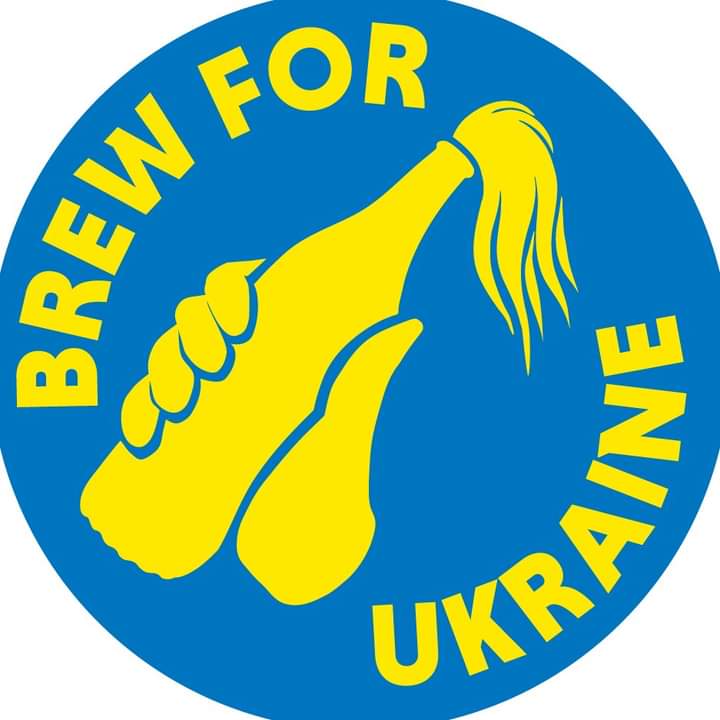
Many breweries around the world brew beer in support of Ukraine, including BeerBox partners
By May 2023, beer production in Ukraine increased by more than a third compared to the same period last year. Currently, Ukraine’s presence on the world stage, including the beer arena, is being strengthened. During this time, thanks to the same Lana Svitankova, the BeerGychka project, the Association of Independent Breweries of Ukraine, and other related parties, the local style of Ukrainian Golden Ale appeared in the international beer classification system (BJCP). More than 500 breweries on the planet took part in the DrinkersForUkraine, RESOLVE, and Brew for Ukraine projects, directing their creative and financial forces to support Ukrainians.
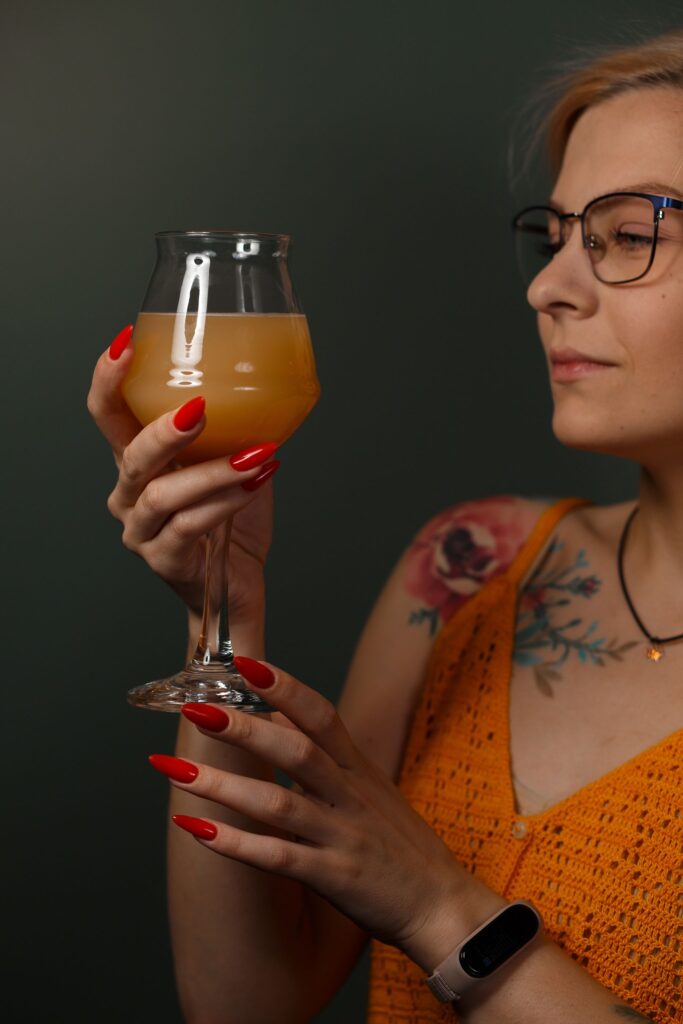
Photoshoot for BeerBox during the war. The model is volunteer Olesia Yesina.
The editors of EURO-ATLANTIC UKRAINE are grateful for the perseverance and indestructibility of the entire BeerBox team and personally to Dmytro Nazarenko for the interview and provided materials.
